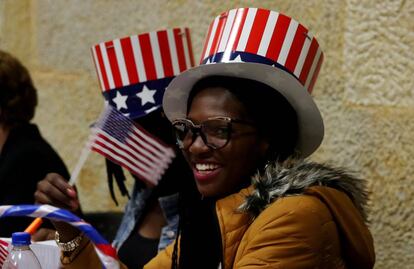Trump victory casts doubt over future US role in Colombian peace talks
President Obama had supported talks with FARC and promised $450 million for post-conflict development

Barely a month after the Colombians unexpectedly rejected a peace deal the government had signed with the leftist FARC guerrillas aimed at ending five decades of conflict, the South American country is now having to come to terms with another unlikely electoral outcome, this time in the United States.
Donald Trump’s victory in the US elections adds further uncertainty to Colombia’s peace process, in which President Barrack Obama has been a key ally of President Juan Manuel Santos during four years of talks with the FARC in Havana.
Trump intends to block relations with Cuba, which will influence US policy toward Colombia
In a recent interview with EL PAÍS, Santos said: “Hillary is a personal friend, her husband and she have supported my government and its predecessors. I only have the highest praise for them. I do not know Trump, but my opinion is that we wouldn’t support his policies.”
The United States has been a key ally in successive Colombian governments’ fight against drug traffickers and the FARC through Plan Colombia, set up under Bill Clinton. Without the economic support and military intelligence Washington has provided over the years it is unlikely that the FARC would have negotiated with the Colombian government.
The US special envoy to the talks, Bernie Aronson, has played a key role in keeping the talks going. The FARC wants one of its leaders, Simón Trinidad, currently in a US jail, returned to Colombia to finish its sentence.
The US has been a key ally to successive Colombian governments
During Santos’ official visit to Washington earlier this year, the Obama administration agreed to support Colombia’s post-conflict development plans. The outgoing president wants congress to approve an initial tranche of $450 million from next year’s budget. Had Clinton won the election, US support for Colombia would have been guaranteed. With Trump in the White House and a Republican majority in both houses, it is hard to see how Colombia will secure US funding to help rebuild the country and keep the peace process going.
Trump’s stated intention to block the normalization of relations with Cuba, begun by Obama, will doubtless influence US policy toward Colombia, at least until Santos’ mandate ends in 2018. The Colombian leader has publicly thanked his Cuban opposite number, Raúl Castro, for his role in facilitating the talks, and half of the FARC delegation remains in Havana, where talks continue with Colombian government representatives.
Venezuela presents another problem. The United States has supported talks between the government of President Nicolás Maduro and the opposition. A Clinton administration would have pressed forward with this approach, or at least kept it alive.
English version by Nick Lyne.
Tu suscripción se está usando en otro dispositivo
¿Quieres añadir otro usuario a tu suscripción?
Si continúas leyendo en este dispositivo, no se podrá leer en el otro.
FlechaTu suscripción se está usando en otro dispositivo y solo puedes acceder a EL PAÍS desde un dispositivo a la vez.
Si quieres compartir tu cuenta, cambia tu suscripción a la modalidad Premium, así podrás añadir otro usuario. Cada uno accederá con su propia cuenta de email, lo que os permitirá personalizar vuestra experiencia en EL PAÍS.
¿Tienes una suscripción de empresa? Accede aquí para contratar más cuentas.
En el caso de no saber quién está usando tu cuenta, te recomendamos cambiar tu contraseña aquí.
Si decides continuar compartiendo tu cuenta, este mensaje se mostrará en tu dispositivo y en el de la otra persona que está usando tu cuenta de forma indefinida, afectando a tu experiencia de lectura. Puedes consultar aquí los términos y condiciones de la suscripción digital.









































